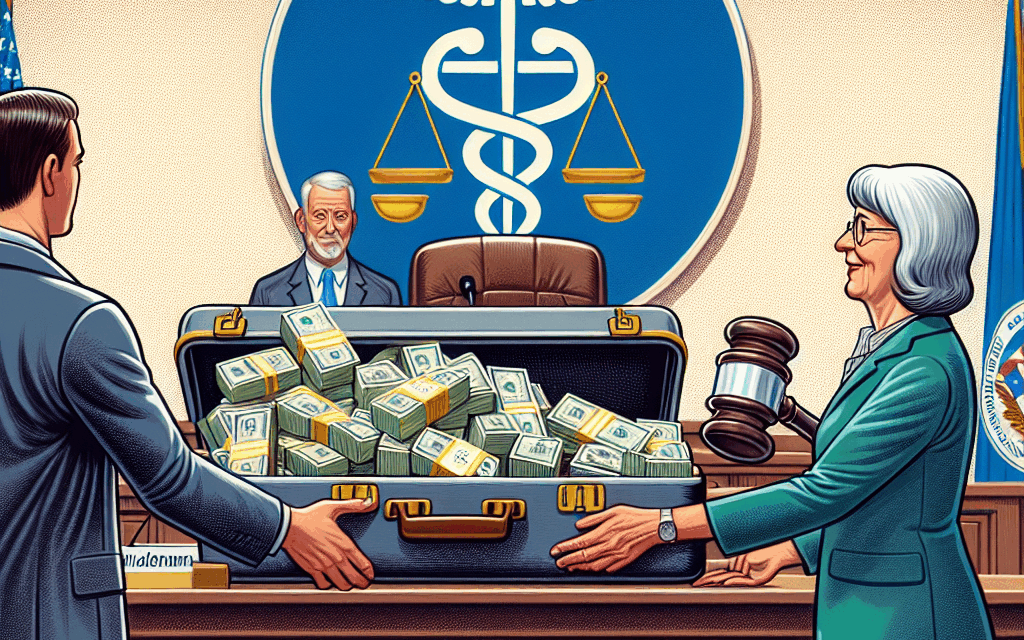CVS Caremark Settles Medicare Fraud Case for $95 Million
In a significant development in the healthcare sector, CVS Caremark, a prominent pharmacy benefit manager (PBM) and subsidiary of CVS Health, has agreed to a settlement of $95 million to resolve allegations of Medicare fraud. This case highlights the ongoing issues of fraud and abuse within the Medicare system, the role of PBMs, and the implications for patients and taxpayers. This article delves into the details of the settlement, the nature of the allegations, the broader context of Medicare fraud, and the implications for the healthcare industry.
Understanding the Allegations Against CVS Caremark
The allegations against CVS Caremark stem from claims that the company engaged in fraudulent practices related to the administration of Medicare Part D, the prescription drug benefit program for Medicare beneficiaries. The core of the allegations revolved around the following key points:
- Improper Billing Practices: CVS Caremark was accused of submitting false claims to Medicare for prescription drugs that were not eligible for reimbursement.
- Inadequate Oversight: The company allegedly failed to implement adequate controls to prevent fraudulent billing practices, leading to significant financial losses for the Medicare program.
- Kickbacks and Incentives: There were claims that CVS Caremark provided financial incentives to pharmacies to promote certain drugs, which could be seen as a violation of anti-kickback statutes.
- Misleading Information: The company was also accused of providing misleading information to beneficiaries regarding their drug coverage and costs.
- Failure to Report Discounts: CVS Caremark allegedly failed to report discounts and rebates received from drug manufacturers, which could have lowered the overall costs for Medicare.
These allegations were serious, as they not only involved potential financial misconduct but also raised ethical concerns about the treatment of vulnerable populations relying on Medicare for their healthcare needs. The settlement, while significant, also reflects a broader trend of increasing scrutiny on PBMs and their practices in the healthcare industry.
The Settlement: What It Entails
The $95 million settlement reached by CVS Caremark is one of the largest in recent years concerning Medicare fraud. The settlement includes several key components:
- Financial Penalties: The majority of the settlement amount will be paid as a financial penalty to the federal government, aimed at compensating for the alleged overpayments made by Medicare.
- Compliance Measures: As part of the settlement, CVS Caremark has agreed to implement enhanced compliance measures to prevent future violations. This includes improved training for employees and stricter oversight of billing practices.
- Monitoring and Reporting: CVS Caremark will be subject to ongoing monitoring and reporting requirements to ensure compliance with Medicare regulations.
- Restitution to Affected Beneficiaries: A portion of the settlement funds may be allocated to reimburse affected Medicare beneficiaries who were impacted by the alleged fraudulent practices.
- Public Disclosure: The settlement will be publicly disclosed, serving as a warning to other companies in the industry about the consequences of engaging in fraudulent practices.
This settlement is significant not only for the financial implications but also for the message it sends to the healthcare industry. It underscores the importance of ethical practices and compliance with federal regulations, particularly in a system as complex as Medicare.
The Broader Context of Medicare Fraud
Medicare fraud is a pervasive issue that costs taxpayers billions of dollars each year. According to the Centers for Medicare & Medicaid Services (CMS), fraud, waste, and abuse in the Medicare program are estimated to account for approximately 10% of total Medicare spending. This translates to tens of billions of dollars lost annually due to fraudulent activities.
The types of Medicare fraud can vary widely, but some common examples include:
- Billing for Services Not Rendered: Providers may bill Medicare for services that were never provided to patients.
- Upcoding: This involves billing for a more expensive service than what was actually performed, resulting in higher reimbursements.
- Kickbacks: Providers may receive kickbacks for referring patients to specific services or products, which is illegal under federal law.
- Phantom Patients: Some providers may create fake patient records to bill Medicare for services that were never delivered.
- Misrepresentation of Services: Providers may misrepresent the nature of services provided to justify higher payments from Medicare.
The impact of Medicare fraud extends beyond financial losses; it can also compromise patient care and erode trust in the healthcare system. When resources are siphoned off through fraudulent activities, it can lead to reduced funding for legitimate services, ultimately affecting patient access to care.
The Role of Pharmacy Benefit Managers (PBMs)
Pharmacy Benefit Managers (PBMs) play a crucial role in the healthcare system, acting as intermediaries between insurers, pharmacies, and drug manufacturers. They are responsible for managing prescription drug benefits for health plans, negotiating prices with drug manufacturers, and determining which medications are covered under a plan.
However, the role of PBMs has come under increasing scrutiny in recent years due to concerns about transparency, pricing practices, and potential conflicts of interest. Some of the key issues surrounding PBMs include:
- Lack of Transparency: Many PBMs do not disclose how they negotiate prices with drug manufacturers or how they determine which drugs are included on their formularies. This lack of transparency can lead to questions about whether patients are receiving the best possible prices for their medications.
- Rebates and Discounts: PBMs often negotiate rebates from drug manufacturers, but these savings may not always be passed on to consumers. Instead, they may be retained by the PBM, leading to higher out-of-pocket costs for patients.
- Formulary Decisions: The decisions made by PBMs regarding which drugs to include on their formularies can significantly impact patient access to medications. Critics argue that these decisions may be influenced by financial incentives rather than clinical efficacy.
- Potential Conflicts of Interest: Some PBMs are owned by health insurers, raising concerns about potential conflicts of interest when it comes to managing drug benefits.
- Impact on Patient Care: The practices of PBMs can directly affect patient care, as patients may face higher costs or limited access to necessary medications due to PBM policies.
The CVS Caremark settlement serves as a reminder of the need for greater accountability and transparency within the PBM industry. As the healthcare landscape continues to evolve, it is essential for stakeholders to address these issues to ensure that patients receive the care they need without unnecessary barriers.
Implications for Patients and Taxpayers
The settlement between CVS Caremark and the federal government has significant implications for both patients and taxpayers. Understanding these implications is crucial for grasping the broader impact of Medicare fraud and the role of PBMs in the healthcare system.
For patients, the settlement may lead to several positive outcomes:
- Increased Accountability: The settlement sends a clear message that fraudulent practices will not be tolerated, potentially leading to improved oversight and accountability within the PBM industry.
- Enhanced Compliance Measures: CVS Caremark’s commitment to implementing enhanced compliance measures may result in better protection for patients against fraudulent billing practices.
- Potential Restitution: A portion of the settlement funds may be used to reimburse affected beneficiaries, providing some financial relief to those impacted by the alleged fraud.
- Improved Access to Medications: As PBMs face increased scrutiny, there may be a push for more transparent pricing practices, ultimately benefiting patients by lowering their out-of-pocket costs for medications.
- Strengthened Trust in Medicare: By addressing fraud and abuse, the settlement may help restore trust in the Medicare program, encouraging beneficiaries to seek necessary care without fear of exploitation.
For taxpayers, the implications are equally significant:
- Financial Recovery: The $95 million settlement represents a recovery of taxpayer dollars that were allegedly lost due to fraudulent practices, reinforcing the importance of holding companies accountable for their actions.
- Reduced Fraudulent Activities: The settlement may deter other companies from engaging in similar fraudulent practices, leading to a reduction in overall Medicare fraud and waste.
- Increased Oversight: The heightened scrutiny of PBMs may lead to more robust regulatory measures, ultimately benefiting taxpayers by ensuring that Medicare funds are used appropriately.
- Long-Term Savings: By addressing fraud and abuse, the government may achieve long-term savings in Medicare spending, which can be redirected to improve services for beneficiaries.
- Public Awareness: The settlement raises public awareness about the issue of Medicare fraud, encouraging individuals to report suspicious activities and advocate for greater accountability in the healthcare system.
In conclusion, the CVS Caremark settlement serves as a critical reminder of the ongoing challenges posed by Medicare fraud and the need for vigilance in protecting taxpayer dollars and patient care. As the healthcare landscape continues to evolve, it is essential for all stakeholders to work together to address these issues and ensure a more transparent and accountable system.
Conclusion: Key Takeaways
The settlement of $95 million by CVS Caremark to resolve allegations of Medicare fraud is a significant development in the healthcare industry. It highlights the ongoing issues of fraud and abuse within the Medicare system and underscores the importance of accountability and transparency in the practices of Pharmacy Benefit Managers (PBMs).
Key takeaways from this case include:
- The allegations against CVS Caremark involved improper billing practices, inadequate oversight, and potential violations of anti-kickback statutes.
- The settlement includes financial penalties, compliance measures, and ongoing monitoring to prevent future violations.
- Medicare fraud is a pervasive issue that costs taxpayers billions of dollars each year, impacting patient care and access to necessary services.
- PBMs play a crucial role in the healthcare system, but their practices have come under scrutiny due to concerns about transparency and potential conflicts of interest.
- The settlement has significant implications for patients and taxpayers, including increased accountability, potential restitution, and long-term savings in Medicare spending.
As the healthcare landscape continues to evolve, it is essential for all stakeholders to remain vigilant in addressing issues of fraud and abuse, ensuring that patients receive the care they need without unnecessary barriers. The CVS Caremark settlement serves as a critical step in this ongoing effort, reinforcing the importance of ethical practices and compliance within the healthcare industry.





